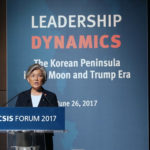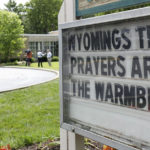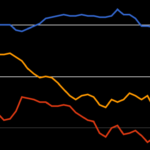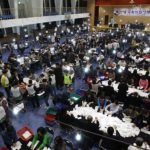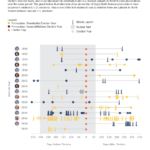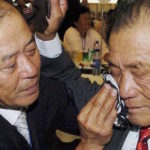June 26, 2017—
The ROK-U.S. Alliance has safeguarded peace and prosperity on the Korean Peninsula and beyond. And today, our alliance covers a whole range of areas including security, economic, social and cultural dimensions. Geographically, the alliance extends beyond the Korean Peninsula, and is now going global.
June 26, 2017, by Robert King—
The tragic death of Otto Warmbier has again raised the question of whether travel to North Korea ought to be prohibited by the United States government. Prohibiting travel by Americans to North Korea has been talked about for some time, primarily on Capitol Hill. Arguments for a travel ban are (1) to protect the safety and wellbeing of American citizens; and (2) travel is a source of hard currency for the Kim regime which goes to the “royal economy” for imported French cognac and luxury automobiles for the young leader, as well as to fund nuclear weapons and ballistic missiles.
May 10, 2017, by Victor Cha and Lisa Collins—
Exit polls from the May 9th election in South Korea indicate that Moon Jae-in will be the country’s next president. Moon will enter office after more than six months of domestic political turmoil following the impeachment of former South Korean president Park Geun-hye. Under these circumstances, Moon is likely to face a series of domestic and foreign policy challenges early in his presidential term.
May 5, 2017, by Gordon LaForge—
On May 9, South Koreans go to the polls in a snap presidential election. Predata signals show that with the vote approaching, online conversations about the economy are louder than those about national security. The latest public opinion surveys found Moon held a commanding lead. But a polling blackout took effect on May 3, leaving observers to wonder how public sentiment may shift in the crucial week before balloting.
April 18, 2017, by Victor Cha—
To study the relationship between North Korean provocations and South Korean elections, Beyond Parallel created a new database of events incorporating both presidential and national assembly elections from the Republic of Korea (ROK) over the last six decades.
April 10, 2017—
To study the relationship between North Korean provocations and South Korean elections, Beyond Parallel created a new database of events incorporating both presidential and national assembly elections from the Republic of Korea (ROK) over the last six decades.
April 3, 2017—
Beyond Parallel conducted a study of whether there are patterns to North Korean behavior around U.S. elections. To carry out this study we created a dataset of U.S. election events, incorporating both presidential and congressional midterm election years, and cross-tabulated this information with our original dataset on North Korean provocations over the same period.
March 8, 2017—
Ambassador Christopher Hill reflects on his personal experience as Assistant Secretary of State for East Asian and Pacific Affairs and head of the U.S. delegation to the Six Party Talks from 2005 to 2009... In 2003, the Six Party Talks were launched to seek a peaceful resolution to the…
January 12, 2017, by Marie DuMond—
Information control is one of a significant list of the terrible human rights abuses by the North Korean regime, as it seeks to control the mind, expression, and thoughts of the citizens as a tool of repression... 91.6 percent of North Korean respondents consume foreign media at least once each month. 83…
January 10, 2017—
The division of the Korean peninsula continues to incur definitive political, social, and economic costs. The human costs of division, however, are often forgotten. .. The division of the Korean peninsula continues to incur definitive political, social, and economic costs.…
